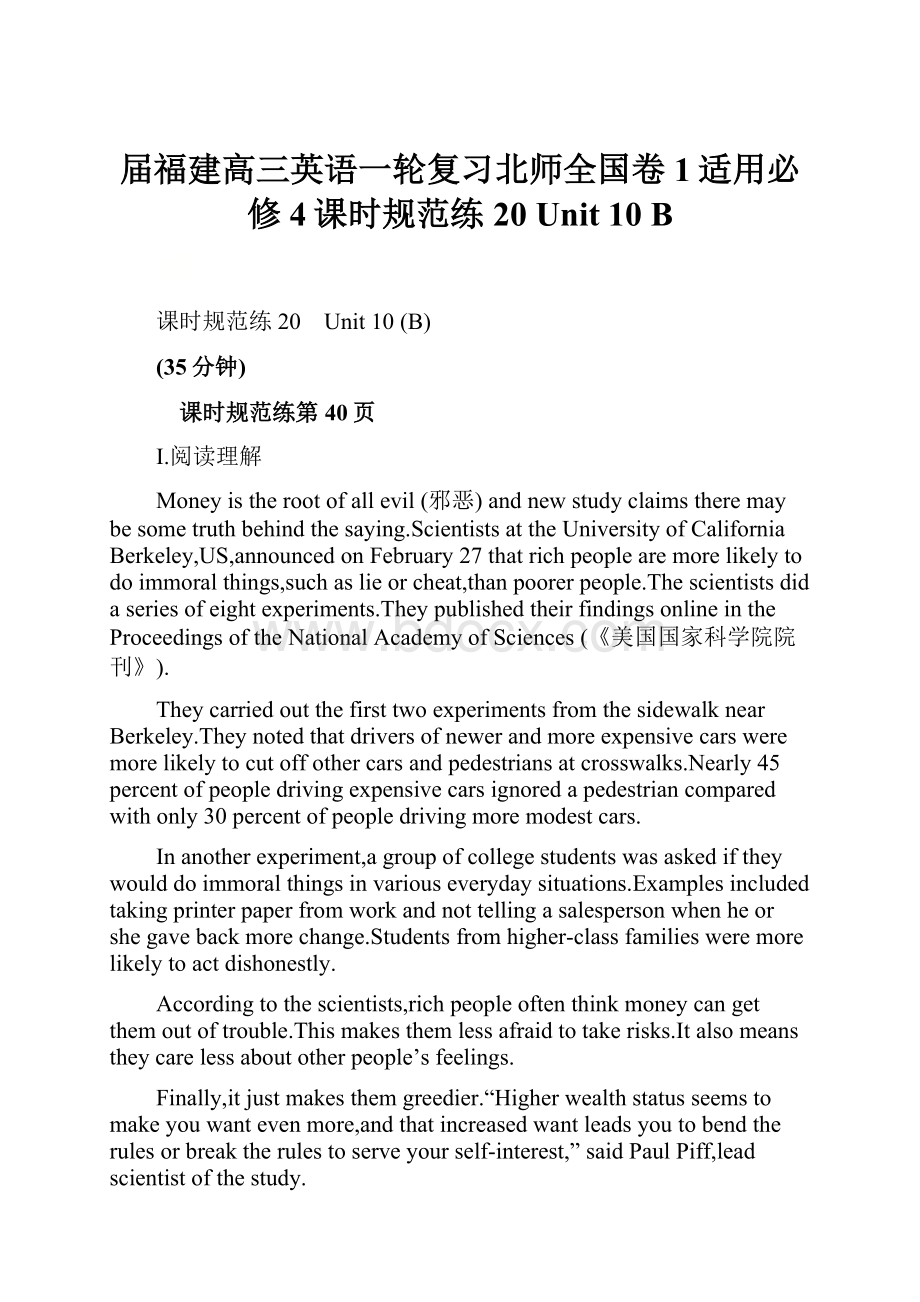届福建高三英语一轮复习北师全国卷1适用必修4课时规范练20 Unit 10 B.docx
《届福建高三英语一轮复习北师全国卷1适用必修4课时规范练20 Unit 10 B.docx》由会员分享,可在线阅读,更多相关《届福建高三英语一轮复习北师全国卷1适用必修4课时规范练20 Unit 10 B.docx(10页珍藏版)》请在冰豆网上搜索。

届福建高三英语一轮复习北师全国卷1适用必修4课时规范练20Unit10B
课时规范练20 Unit10(B)
(35分钟)
课时规范练第40页
Ⅰ.阅读理解
Moneyistherootofallevil(邪恶)andnewstudyclaimstheremaybesometruthbehindthesaying.ScientistsattheUniversityofCaliforniaBerkeley,US,announcedonFebruary27thatrichpeoplearemorelikelytodoimmoralthings,suchaslieorcheat,thanpoorerpeople.Thescientistsdidaseriesofeightexperiments.TheypublishedtheirfindingsonlineintheProceedingsoftheNationalAcademyofSciences(《美国国家科学院院刊》).
TheycarriedoutthefirsttwoexperimentsfromthesidewalknearBerkeley.Theynotedthatdriversofnewerandmoreexpensivecarsweremorelikelytocutoffothercarsandpedestriansatcrosswalks.Nearly45percentofpeopledrivingexpensivecarsignoredapedestriancomparedwithonly30percentofpeopledrivingmoremodestcars.
Inanotherexperiment,agroupofcollegestudentswasaskediftheywoulddoimmoralthingsinvariouseverydaysituations.Examplesincludedtakingprinterpaperfromworkandnottellingasalespersonwhenheorshegavebackmorechange.Studentsfromhigher-classfamiliesweremorelikelytoactdishonestly.
Accordingtothescientists,richpeopleoftenthinkmoneycangetthemoutoftrouble.Thismakesthemlessafraidtotakerisks.Italsomeanstheycarelessaboutotherpeople’sfeelings.
Finally,itjustmakesthemgreedier.“Higherwealthstatusseemstomakeyouwantevenmore,andthatincreasedwantleadsyoutobendtherulesorbreaktherulestoserveyourself-interest,”saidPaulPiff,leadscientistofthestudy.
Piffpointedoutthatthefindingsdon’tmeanthatallrichpeopleareuntrustworthyorallpoorpeoplehonest.Hesaidtheexperimentsweretoshowhowpeoplelivingindifferentsocialsituationsexpresstheirinstincts(本能)andvaluesindifferentways.
【解题导语】本文是一篇议论文。
“金钱是万恶之源”。
美国科学家用实验证明富人比穷人更有可能去做一些不道德的事。
1.Bysaying“moneyistherootofallevil”,theauthorwantsto .
A.linkwealthwithbadbehavior
B.drawreaders’attentiontotheresearch
C.showhowthesayingprovesthefindings
D.defendrichpeoplewhodoimmoralthings
答案:
B
解析:
推理判断题。
作者在文章一开头引用谚语“金钱是万恶之源”以引出本文话题,其目的是引起读者对科学家们调查这一现象的兴趣。
故选B项。
2.Accordingtothescientists,whichisNOTthefactorthatmakesrichpeopleimmoral?
A.Theywelcomerisks.
B.Theyhavemoredesires.
C.Theybelievemoneytalks.
D.Theybecomemoreselfish.
答案:
A
解析:
细节理解题。
根据第四段可知,富人们总是认为金钱能帮助他们摆脱困境,这使得他们不畏惧冒险,但这并不意味着他们喜欢冒险,也不是赞成富人们不道德的因素。
故选A项。
3.Whydidthescientistsdotheexperiments?
A.Toshowhowsocialstatusaffectspeople’smorality.
B.Toshowpeople’sinstinctsandvaluesindifferentways.
C.Totestwhetherthesaying“moneyistherootofallevil”istrue.
D.Toshowthedifferencebetweenhigher-classpeopleandlower-classpeople.
答案:
A
解析:
细节理解题。
根据文章最后一段中的“Hesaidtheexperimentsweretoshowhowpeoplelivingindifferentsocialsituationsexpresstheirinstincts(本能)andvaluesindifferentways.”该实验的目的是展示不同的社会地位是如何影响人们的道德行为的。
故选A项。
4.Whatdoesthepassagereallywanttoshowus?
A.Thepoorarerespectable.
B.Moneyistherootofallevil.
C.Allrichpeopleareuntrustworthy.
D.Thericharemorelikelytoactbadly.
答案:
D
解析:
主旨大意题。
文章第一段直接给出文章主旨,尤其是根据第二句中的“richpeoplearemorelikelytodoimmoralthings,suchaslieorcheat”可知,文章主要说明富人更有可能做不道德的事。
故选D项。
Ⅱ.完形填空
BeingbornandbroughtupinavillagecalledBruis,Ilivedasimplelifewithmyfather.Iwas16whenonemorning,DadtoldmeIcoulddrivehimintoa 1 villagecalledBurbank,onconditionthatItookthecarintobe 2 atanearbygarage.Ireadilyaccepted.IdroveDadintoBurbank,and 3 topickhimupat4pm;thendroppedoffthecaratthe 4 .Withseveralhourstospare,Iwenttoatheater. 5 ,whenthelastmoviefinished,itwassix.Iwastwohourslate!
IknewDadwouldbeangryifhe 6 I’dbeenwatchingmovies.SoIdecidednottotellhimthetruth.WhenI 7 thereIapologizedforbeinglate,andtoldhimI’d 8 asquicklyasIcould,butthatthecarhadneededamajorrepair.I’llneverforgetthe 9 hegaveme.“I’mdisappointedyou 10 youhavetolietome,Jason.”Dadlookedatmeagain.“Whenyoudidn’t 11 ,Icalledthegaragetoaskiftherewereany 12 ,andtheytoldmeyouhadn’tyetpickedupthecar.”Ifelt 13 asIweaklytoldhimtherealreason.A 14 passedthroughDadashelistenedattentively.“I’mangrywith 15 .IrealizeI’vefailedasafather.I’mgoingtowalkhomenowandthinkseriouslyabout 16 I’vegonewrongalltheseyears.”“ButDad,it’s18miles!
”Myprotestsandapologieswere 17 .Dadwalkedhomethatday.Idrovebehindhim, 18 himalltheway,buthewalkedsilently.
SeeingDadinsomuch 19 andemotionalpainwasmymostpainfulexperience.However,itwas 20 themostsuccessfullesson.Ihaveneverliedsince.
【解题导语】本文是一篇记叙文。
作者16岁那一年,因看电影而延误了去接父亲,便谎称车没修好。
不料识破了谎言的父亲满是自责,执意走回家,这让作者因惭愧而无地自容,从此便不再说谎。
1.A.small B.lonely
C.distantD.familiar
答案:
C
解析:
由倒数第二段中的“it’s18miles!
”可知,这个村子很“远(distant)”。
2.A.keptB.repaired
C.watchedD.changed
答案:
B
解析:
由空处后的garage可知,作者要把车送到附近的一个修理厂“修理(repair)”。
3.A.agreedB.planned
C.determinedD.promised
答案:
D
解析:
根据第二段内容可知,作者把父亲送到了村子,并“答应(promise)”下午四点去接他。
4.A.villageB.community
C.theaterD.garage
答案:
D
解析:
由上文“atanearbygarage”可知,作者把车停在了“停车场(garage)”。
5.A.HoweverB.Then
C.ThereforeD.Still
答案:
A
解析:
由后面“whenthelastmoviefinished,itwassix.Iwastwohourslate!
”可知,前后语意存在转折关系,故应用However。
6.A.foundoutB.gaveout
C.figuredoutD.cameout
答案:
A
解析:
由前文可知,作者答应四点去接父亲的,而此时已是六点,故如果父亲“发现(findout)”作者一直在看电影,他一定会很生气。
7.A.wentB.ran
C.walkedD.hurried
答案:
D
解析:
由前文可知,作者已经迟到了,故“匆忙(hurry)”赶到那里,并为自己的迟到向父亲道歉。
8.A.comeB.left
C.movedD.started
答案:
A
解析:
作者告诉父亲自己已尽快“赶来(come)”,但车需要大修。
9.A.wordB.appearance
C.lookD.face
答案:
C
解析:
由下文“Dadlookedatmeagain.”的暗示可知,作者永远都无法忘记父亲的“眼神(look)”。
10.A.findB.believe
C.feelD.decide
答案:
C
解析:
父亲感到很失望,是因为作者“觉得(feel)”必须向其说谎。
11.A.turnaroundB.driveout
C.goawayD.turnup
答案:
D
解析:
由上文可知,作者并未按时间回来接父亲,故选D项turnup表示“出现”。
12.A.questionsB.problems
C.mistakesD.faults
答案:
A
解析:
作者未按时到,父亲便给修理厂打了电话,询问是否有“问题(question)”。
13.A.ashamedB.frightened
C.nervousD.surprised
答案:
A
解析:
由上文可知,作者说谎被父亲发现,故感到“羞愧(ashamed)”。
14.A.nervousnessB.sadness
C.silenceD.thought
答案:
B
解析:
由下面父亲所说的话可知,此处表示父亲脸上掠过一丝“悲伤(sadness)”。
15.A.youB.myself
C.meD.yourself
答案:
B
解析:
由下文“IrealizeI’vefailedasafather.”可知,父亲很生自己的气。
故选myself。
16.A.whereB.how
C.whyD.when
答案:
A
解析:
父亲打算走回家,并认真思考自己这些年“哪里(where)”做错了。
17.A.meaninglessB.useless
C.helplessD.worthless
答案:
B
解析:
由下文“Dadwalkedhomethatday.”可知,作者的反对和道歉都“没用(useless)”。
18.A.askingB.persuading
C.beggingD.following
答案:
C
解析:
由上文可知,作者一路开车跟在父亲身后,并“求(beg)”他上车,但他只是默默地走。
19.A.naturalB.practical
C.personalD.physical
答案:
D
解析:
看到父亲“身体上(physical)”和情感上都很痛是作者最痛苦的经历。
此处选D项和后面emotional对应。
20.A.indeedB.always
C.alsoD.almost
答案:
C
解析:
由语境可知,这对作者来说这“也(also)”是最成功的一次教训,作者自那以后再也没说过谎了。
Ⅲ.语篇填空
Oneofmyfriendswasfacingahardissueregardingherwork.Shetoldmethis,1. (ask)howshecouldfindthewayout.ActuallyIreallyhadnothingtoshowheraboutthewayout.Icoulddonothingtogiveherasolutioninthat2.
problemshewasfacingwasentirelybeyondwhatIcouldhelp3. .AnywayIdecided4. (do)theleastIcoulddo:
Justlistentoherandmakeherfeel5.
(comfort).
WhatIdidcertainlywasreallynothingtoresolveherproblem6. thenexttimeshemetmeshewasveryhappy.Ifeltgreattoseeher7. (satisfy),andshesaidthatshewasgratefulbecauseshewascapableofresolvingherissue,butjust8. (need)someonebyhersidewhowouldlistentoher.
Ifelt9. (extreme)happybecauseIcouldmakeherhappy.Manytimespeopledon’tneedahand,justthemoralsupportwhich10. (keep)themgoing,andittakesnothing.Reallynothingoutofustogivethemthatjoy.
Keepsmiling!
答案:
1.asking 句子主语和ask之间为主动关系,故用现在分词做状语。
2.the 此处的problem指文章第一句话中的ahardissue,表示特指应用定冠词the。
3.with 在介词beyond后是一个宾语从句,what在从句中充当helpwith的宾语。
4.todo 在decide后应用动词不定式做宾语。
fortable 在连系动词feel后用形容词做表语。
6.but 前面说明作者没有真正做什么可以解决她的问题,后面说明下一次见到她时她很高兴,故语意存在转折,用but连接并列句。
7.satisfaction 前面有形容词性物主代词her修饰,故应用名词。
8.needed 叙述过去的事应用一般过去时态。
9.extremely 修饰形容词应用副词。
10.keeps 该句前面用的是一般现在时,说明一般情况,故此处也应用一般现在时态。
Ⅳ.书面表达
(2018·全国Ⅰ卷)
假定你是李华,你的新西兰朋友Terry将去中国朋友家做客,发邮件向你询问有关习俗。
请你回复邮件,内容包括:
1.到达时间;
2.合适的礼物;
3.餐桌礼仪。
注意:
1.词数100左右;
2.可以适当增加细节,以使行文连贯。
参考范文
DearTerry,
Howareyougoing?
Inyourlastletter,youaskedmeaboutbeingaguesttoaChinesefriend’shome.Now,Iamwritingtoinformyouofsomerelevantdetails.
Tobeginwith,accordingtoourtradition,youaresupposedtoarriveearly,sothatyoucanhelpthefamilypreparethedinner,whichismeaningfulandinteresting.Besides,you’dbetterbringsomegifts,likeabookoraChineseknot.What’smore,whenyouareenjoyingthemeal,youneedtoavoidmakingnoiseswhilechewingfood.
Hopefully,thesesuggestionswouldbehelpfulforyou.Ihavetheconfidencethatyouwillhaveagreattime.
Bestwishes!
Yours,
LiHua